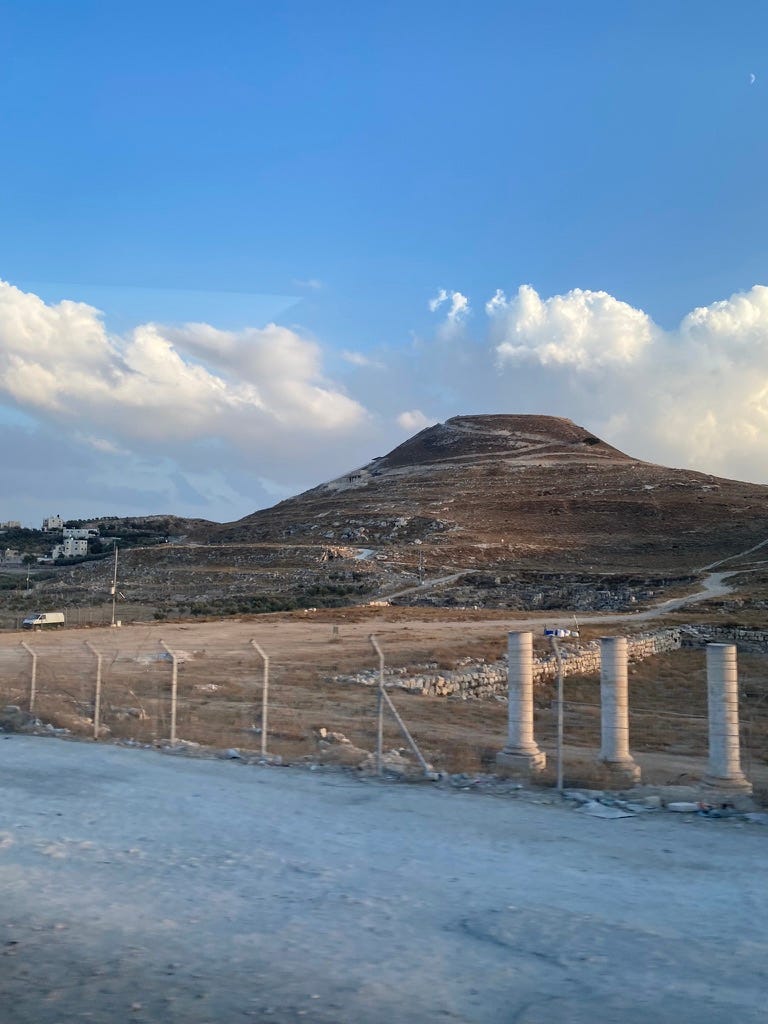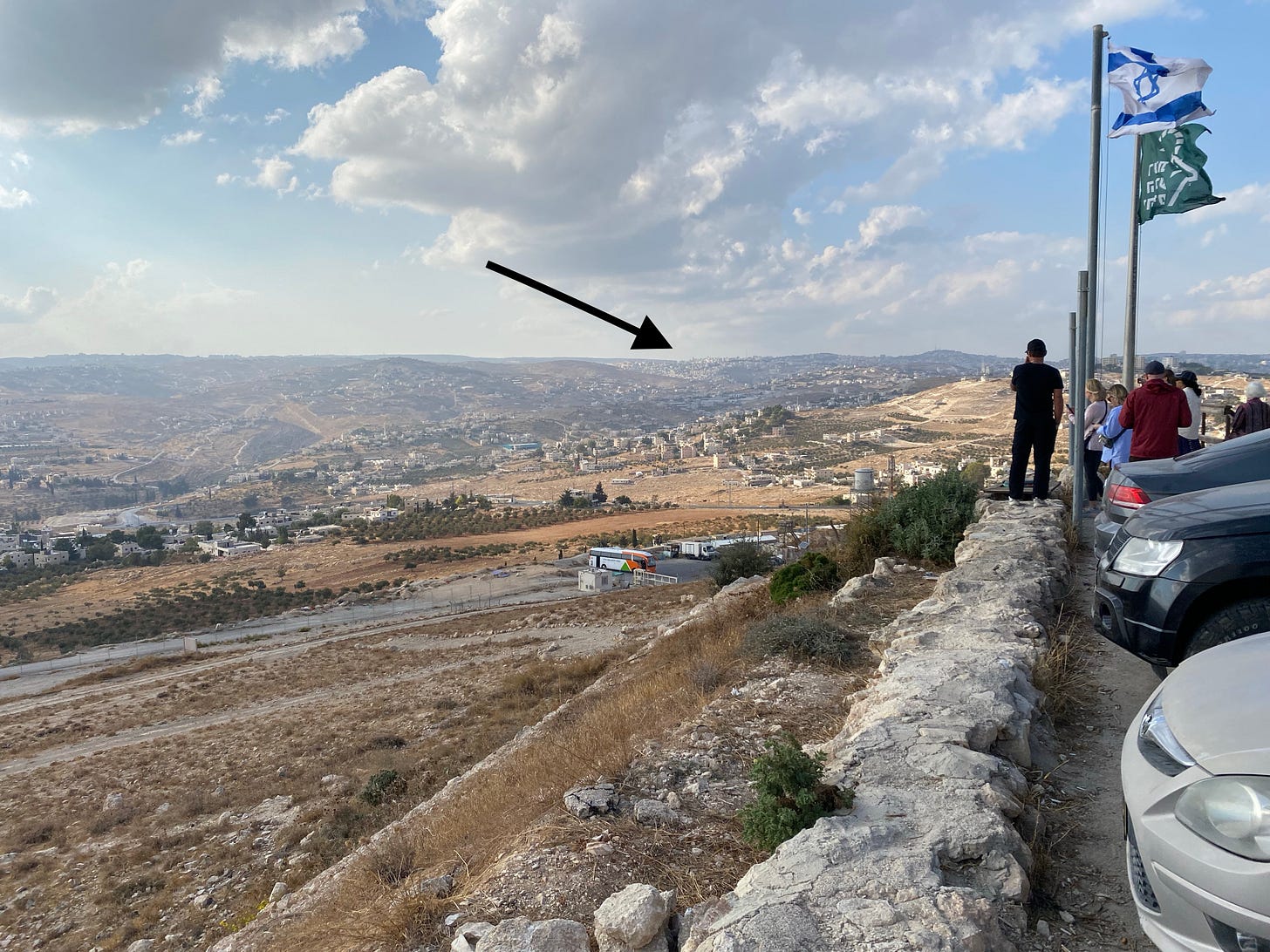Last year I was able to tour Israel with a group from my church. On the day we were supposed to tour Masada, we had to take a detour. Instead, we went to the Herodium (alternately spelled Herodion). I was thrilled. I would certainly have been interested in Masada, but my sole disappointment in the trip had been that we would not be visiting the Herodium. In 40 BC, Herod the Great was fleeing from an army led by his nephew, Antigonus. The army caught up with Herod who turned to fight, winning a surprise victory.
Herod decided to celebrate his victory by building a magnificent palace on top of the nearby hill. After deciding the hill wasn’t impressive enough, Herod turned it into an artificial mountain and then built his palace. You know, like you do. One of the ancient world’s great builders, Herod chose the Herodium, of all his works, as the place he would be buried.
Something that struck me while I was in Israel was how small the country is. I was so accustomed to living in an enormous country like America, that it was a bit jarring to realize how close all of these historical sites are to one another. Almost all of the biblical sites that are so familiar to us are within, at most, a few hours’ drive. For example, a little less than 8 miles to the north of the Herodium lies Jerusalem. Between both of them lies Bethlehem.
I was shocked when we drove into Bethlehem, not because of anything about the town itself (though it’s very strange to see a cell phone store and a Subway in Jesus’ birthplace) but because of how close it was to Jerusalem. Barely 20 minutes after getting in the bus at our hotel in Jerusalem, we had arrived.
I was surprised because I had assume Bethlehem was a remote, middle-of-nowhere village. Now, I saw God’s decision to be born there in a new light. He deliberately chose to be born in a poor village rather than the nearby bustling city. It also seems to me intentional that he chose to be born nearly in the shadow of the Herodium. When we arrived there, our guide pointed out to us that it was possible to see Bethlehem from the ruins. God chose to be born within sight of his peoples’ capital city and a monument built by the “king” of the Jews.
Jesus didn’t have to be born in Bethlehem. Yes, I know there is the prophecy, but what I mean is God could have designated anywhere as the town of his birth. Why not Jerusalem? To me, being born between Jerusalem and the Herodium seems like a rejection of both kingdoms of this world (exemplified by Rome and its regional ruler, Herod) and the kingdom God’s people were seeking to build.
In Daniel 2, Babylonian king Nebuchadnezzar dreams of a great statue, which Daniel tells him represents the kingdoms of the world. The golden head is Babylon, and the other parts of the body represent kingdoms yet to come. After all of the statue is surveyed, a stone “cut from the mountain” strikes the base of the statue, destroying it and then growing until it fills the earth.
When I think about Jesus being born almost equidistant between the Herodium and Jerusalem, I think about Nebuchadnezzar’s dream and God’s ancient promise to replace the kingdoms of this world with his own. Herod’s mountaintop palace was his glory, yet its ultimate futility is seen in every 50-person church meeting in the auditorium of a local middle school. You can tour Herod’s kingdom, while ours is filling the earth.
So much for the Herodium; what of Jerusalem? It seems to me that Jesus rejected it as well. Or rather, he was rejected by Jerusalem. Jesus and the leaders of his people were simply building entirely different kingdoms. The Jewish leaders were convinced they were building God’s kingdom, but theirs would not even outlast Rome. Jesus tried to warn them many times that the road they were on could only lead to destruction, but they would not listen. It wasn’t just a new kingdom of Israel that Jesus warned against, though.
The kingdom God most wants to destroy is the one we are building in our heart.
We all spend our lives building up one kingdom or another. We are all in danger of convincing ourselves that the kingdom in our heart is, in fact, the kingdom God wants. But we will always tend to build our own tiny kingdom in the midst of his. We are sure that the two can coexist side by side. They cannot.
None of us can claim his endorsement for the tiny kingdoms (of course, we call them “brands”) we are building. Jesus rejected Jerusalem for the same reason he rejected Rome, because he loved the people too much to let them continue to live in their false kingdoms. He wants to tear them to the ground so we can see them for what they really are.
Born in little Bethlehem, no kingdom of this world can lay claim to Jesus. There is only one Kingdom of God; he can leave no other standing.




Thanks - very interesting.
Since your article addressed Biblical matters I'd like to recommend Hillsdale College's 6 part series on the book of Genesis. It is excellent and increased my understanding of God's plan and nature.
Additionally, I purchased and read Dennis Prager's commentary on Exodus, it was illuminating and greatly enhanced my faith (he subsequently released Genesis and Deuteronomy with Numbers to follow next year) and I highly recommend these volumes also. Mr. Prager speaks and reads Biblical Hebrew fluently and his insights are invaluable.
One example is the binding of Isaac. I was taught that this was a test of Abraham's faith which I believe to correct. Prager pointed out that in addition God illustrated his opposition to child sacrifice which was rampant in Bronze Age societies which set the Torah and the Hebrews apart from the other societies/tribes of the day.
What I've come to realize is that my Christian education glossed over the OT which left gaping hole in my understanding of God's nature and plan. These resources have helped to full that hole.
Have a merry and blessed Christmas.
Great post, Jack!
Reminds me of 1 Corinthians 3:11-15 “For no one can lay any foundation other than the one already laid, which is Jesus Christ. 12 If anyone builds on this foundation using gold, silver, costly stones, wood, hay or straw, 13 their work will be shown for what it is, because the Day will bring it to light. It will be revealed with fire, and the fire will test the quality of each person’s work. 14 If what has been built survives, the builder will receive a reward. 15 If it is burned up, the builder will suffer loss but yet will be saved—even though only as one escaping through the flames.”